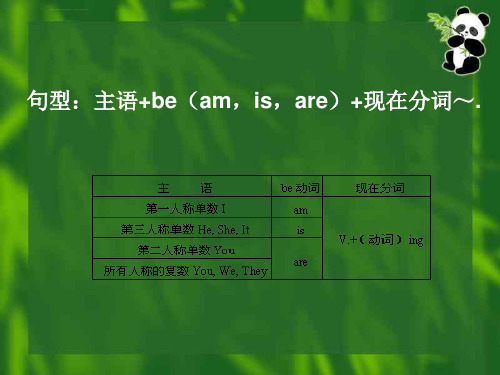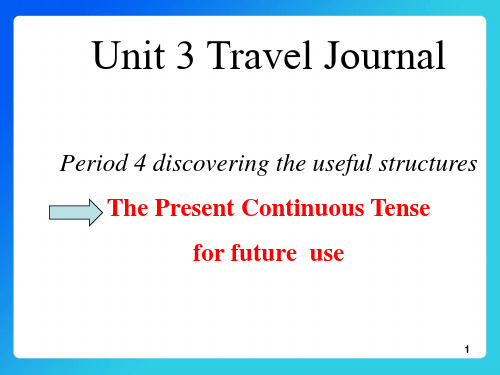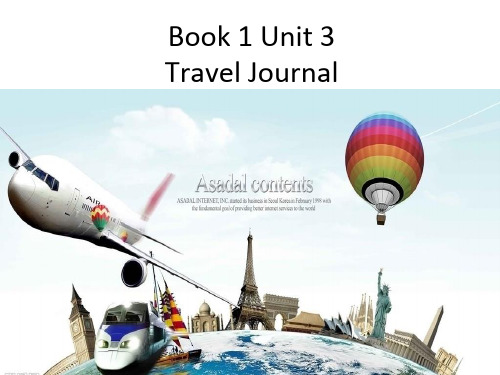高中英语语法 现在进行时表将来 课件(共20张)
合集下载
高一英语必修一unitGrammar现在进行时表将来PPT课件

第18页/共23页
8. At this time tomorrow, ____ over the Atlantic. A. we’re going to fly B. we’ll be flying C. we’ll fly D. we’re to fly
第19页/共23页
9. ---Did you tell Julia about the result? --- Oh, no, I forgot. I ____ her now.
第9页/共23页
⑤ be +动词的ing形式:表示按计划或安排要发生的事, 含义是 “预定要……” 这一结构常用趋向动词 go, arrive, come, leave, start, stay , return 和 play, do, have, work, wear, spend, see, meet等 。
第13页/共23页
实例: At this time tomorrow ____ over the Atlantic. (2003北京)
A. we’re going to fly
B. we’ll be flying
C. we’ll fly
D. we’re to fly
第14页/共23页
练一练!
1.---Did you write to Grace last summer?
---No, mine____ there behind the door.
A. is hanging
B. has hung
C. hangs
D. hung
第17页/共23页
6. --- Can I join the club, Dad?
--- You can when you ___ a bit old.
语法-进行时表将来ppt课件.ppt

1.The building___C____ , I can't stand its noise.
A. builds
B. is built
C. is being built D. was being built
2. I can't catch up with the fashion, because
1,说话时正在进行的动作 或所处状态
*The telephone is ringing, would you answer it, please? *What are you doing? * I’m writing a letter. 常与now ,right now, at present , at the moment , these days等时间状语连用
3,现在时表将来。a.表示即将发生的或预定中 病原体侵入机体,消弱机体防御机能,破坏机体内环境的相对稳定性,且在一定部位生长繁殖,引起不同程度的病理生理过程 计划好的活动。现在进行时表示将来时,即表示 按计划或安排在最近将要进行的动作。 这种用法比较生动,给人一种期待感。 它常表示最近或较近的将来,
* I want to know when he ___B____ for New York tomorrow. A. has left B. is leaving C. had left D. has been leaving
• He___B____ of how he can do more for the people.
is no easy task because technology ____A___ so rapidly.
A. is changing B. has changed C. will have changed D. will change 3 Rainforests ____C___ and burned at such a
A. builds
B. is built
C. is being built D. was being built
2. I can't catch up with the fashion, because
1,说话时正在进行的动作 或所处状态
*The telephone is ringing, would you answer it, please? *What are you doing? * I’m writing a letter. 常与now ,right now, at present , at the moment , these days等时间状语连用
3,现在时表将来。a.表示即将发生的或预定中 病原体侵入机体,消弱机体防御机能,破坏机体内环境的相对稳定性,且在一定部位生长繁殖,引起不同程度的病理生理过程 计划好的活动。现在进行时表示将来时,即表示 按计划或安排在最近将要进行的动作。 这种用法比较生动,给人一种期待感。 它常表示最近或较近的将来,
* I want to know when he ___B____ for New York tomorrow. A. has left B. is leaving C. had left D. has been leaving
• He___B____ of how he can do more for the people.
is no easy task because technology ____A___ so rapidly.
A. is changing B. has changed C. will have changed D. will change 3 Rainforests ____C___ and burned at such a
高一人教现在进行时表将来PPT课件

A. finished; are going B. finished; go C. finishes; are going D. finishes; go
第14页/共21页
2 Because the shop______C_____, all the T-shirts
are sold at half price.(2004年) A. has closed down B. closed down C. is closing down D. had had closed down
2 表示交通方式、行程安排的动词,例如 fly, walk, ride, drive, take (a bus, a boat, a taxi) 等的现在进行时也经常用于表示将来。
第4页/共21页
1 He will write you a letter next week.他下个星期 给你写信。(将要发生动作)
第15页/共21页
3. --- You’ve left the light on.
---Oh, I have. ___ and turn it off.
A. I go
B. I’ve gone
C. I’ll go
D. I’m going
第16页/共21页
4. Selecting a mobile phone for personal use is no easy task because technology ____ so rapidly. A. will change B. has changed C. will have changed D. is changing
A am taking B. have taken C. take D. will have taken
第14页/共21页
2 Because the shop______C_____, all the T-shirts
are sold at half price.(2004年) A. has closed down B. closed down C. is closing down D. had had closed down
2 表示交通方式、行程安排的动词,例如 fly, walk, ride, drive, take (a bus, a boat, a taxi) 等的现在进行时也经常用于表示将来。
第4页/共21页
1 He will write you a letter next week.他下个星期 给你写信。(将要发生动作)
第15页/共21页
3. --- You’ve left the light on.
---Oh, I have. ___ and turn it off.
A. I go
B. I’ve gone
C. I’ll go
D. I’m going
第16页/共21页
4. Selecting a mobile phone for personal use is no easy task because technology ____ so rapidly. A. will change B. has changed C. will have changed D. is changing
A am taking B. have taken C. take D. will have taken
高中英语语法 现在进行时表将来PPT

The Present Continuous Tense for Future Actions
Step 1
1) Marry is leaving for Beijing by plane tomorrow.
2) Bob is going to the airport by taxi next week.
高中英语语法 现在进行时表将来(共29张PPT)
高中英语语法 现在进行时表将来(共29张PPT)
(3) 表示不久之后肯定发生,或按计划、 安排将要做的事,常与未来的时间状语 连用,动词多是表示位移的,如come, go , leave, arrive, start, begin等 Mother is taking us home on Sunday. 星期天母亲将带我们回老家。
高中英语语法 现在进行时表将来(共29张PPT)
高中英语语法 现在进行时表将来(共29张PPT)
Translate the following statements: 1. 我下个月将去美国。 —I a—m—go—in—g t—o A—m—er—ic—a n—ex—t m—o—nt—h.— 2. 我姑姑在信上说她后天将到我们家。 _M_y__au_n_t_s_a_i_d_s_h_e_i_s _a_rr_i_v_in_g_a_t_o_u_r_h_o_m__e — the—d—ay—af—ter—to—m—or—ro—w—in—th—e l—ett—er—. —
高中英语语法 现在进行时表将来(共29张PPT)
高中英语语法 现在进行时表将来(共29张PPT)
表示将来时态的其它方法:
will/shall+动词原形,表示将来某个时间 要发生的动作或存在的状态;或表示自然 趋势或非主语意志。 He will write you a letter next week. I shall be sixteen years old next month.
Step 1
1) Marry is leaving for Beijing by plane tomorrow.
2) Bob is going to the airport by taxi next week.
高中英语语法 现在进行时表将来(共29张PPT)
高中英语语法 现在进行时表将来(共29张PPT)
(3) 表示不久之后肯定发生,或按计划、 安排将要做的事,常与未来的时间状语 连用,动词多是表示位移的,如come, go , leave, arrive, start, begin等 Mother is taking us home on Sunday. 星期天母亲将带我们回老家。
高中英语语法 现在进行时表将来(共29张PPT)
高中英语语法 现在进行时表将来(共29张PPT)
Translate the following statements: 1. 我下个月将去美国。 —I a—m—go—in—g t—o A—m—er—ic—a n—ex—t m—o—nt—h.— 2. 我姑姑在信上说她后天将到我们家。 _M_y__au_n_t_s_a_i_d_s_h_e_i_s _a_rr_i_v_in_g_a_t_o_u_r_h_o_m__e — the—d—ay—af—ter—to—m—or—ro—w—in—th—e l—ett—er—. —
高中英语语法 现在进行时表将来(共29张PPT)
高中英语语法 现在进行时表将来(共29张PPT)
表示将来时态的其它方法:
will/shall+动词原形,表示将来某个时间 要发生的动作或存在的状态;或表示自然 趋势或非主语意志。 He will write you a letter next week. I shall be sixteen years old next month.
现在进行时表将来通用课件

特点
使用现在进行时表达未来的动作 或状态,强调该动作或状态即将 发生。
与其他时态的区别
与一般现在时的区别
一般现在时表示现在发生的动作或状 态,不涉及未来。
与一般将来时的区别
一般将来时明确表示未来的动作或状 态,与现在时间没有直接联系。
使用的情境与场合
计划安排
表达即将发生的动作
当计划在未来某个时间点进行某个动 作或事件时,可以使用现在进行时表 将来。
示例 They are getting married next month.(他们下个月结 婚。)
表示预测或推断的动作
01
总结词
这个时态用于描述基于当前情况或常识的预测或推断,通常表示一种可
能性或趋势。
02 03
详细描述
现在进行时可以表示基于当前情况或常识的预测或推断,通常表示一种 可能性或趋势,如“The weather is getting warmer, so spring is coming”(天气越来越暖和,所以春天来了)。
在学术活动的日程安排或会议议程中,现在进行时可以用来表示未来的计划或活动,例如 “会议正在安排在周三上午9点开始”。
在商务沟通中的应用
商务计划和报告
在制定商业计划或撰写商业报告 时,可以使用现在进行时来描述 未来的目标、计划或预期成果, 例如“公司正在制定下一财年的 销售目标”。
会议和谈判
在进行商务会议或谈判时,现在 进行时可以用来表达即将讨论的 议题或即将达成的协议,例如“ 我们正在讨论合作的具体细节”。
在日常交流中的应用
日常闲聊
在非正式的日常闲聊中,人们常常使用现在进行时来表达即将发 生的事情,例如“我们正在去公园”表示即将去公园。
安排和计划
使用现在进行时表达未来的动作 或状态,强调该动作或状态即将 发生。
与其他时态的区别
与一般现在时的区别
一般现在时表示现在发生的动作或状 态,不涉及未来。
与一般将来时的区别
一般将来时明确表示未来的动作或状 态,与现在时间没有直接联系。
使用的情境与场合
计划安排
表达即将发生的动作
当计划在未来某个时间点进行某个动 作或事件时,可以使用现在进行时表 将来。
示例 They are getting married next month.(他们下个月结 婚。)
表示预测或推断的动作
01
总结词
这个时态用于描述基于当前情况或常识的预测或推断,通常表示一种可
能性或趋势。
02 03
详细描述
现在进行时可以表示基于当前情况或常识的预测或推断,通常表示一种 可能性或趋势,如“The weather is getting warmer, so spring is coming”(天气越来越暖和,所以春天来了)。
在学术活动的日程安排或会议议程中,现在进行时可以用来表示未来的计划或活动,例如 “会议正在安排在周三上午9点开始”。
在商务沟通中的应用
商务计划和报告
在制定商业计划或撰写商业报告 时,可以使用现在进行时来描述 未来的目标、计划或预期成果, 例如“公司正在制定下一财年的 销售目标”。
会议和谈判
在进行商务会议或谈判时,现在 进行时可以用来表达即将讨论的 议题或即将达成的协议,例如“ 我们正在讨论合作的具体细节”。
在日常交流中的应用
日常闲聊
在非正式的日常闲聊中,人们常常使用现在进行时来表达即将发 生的事情,例如“我们正在去公园”表示即将去公园。
安排和计划
高二英语课件必修现在进行时表将来

添加 标题
描述未来可能性或假设:如“If the weather stays fine, we might go for a picnic this weekend.”
添加 标题
在 新 闻 标 题 中 使 用 : 如 “ Bre x i t Ta l k s to Resume Next Week”
添加标题
添加标题
添加标题
添加标题
现在进行时表将来通常用于表示 计划、安排、打算等,而将来进 行时通常用于表示预测、推测等。
现在进行时表将来表示的是一次 性的动作或状态,而将来进行时 表示的是持续性的动作或状态。
现在进行时表将来在哪些情况下不适用?
当句子中有明确的时间状语时,如“明天”、“下周”等,通常不使用现在进行时表将来。
结构和特点
现在进行时表将来的基本结构:主语+be+doing+future 特点:表示将来计划或安排的动作或状态 例子:I am going to the cinema tonight. 与一般将来时的区别:现在进行时表将来更强调计划性和确定性
添加标题 添加标题 添加标题 添加标题 添加标题 添加标题
现在进行时表将 来可以表示将来 发生的动作或状 态,而一般现在 时不能表示将来 发生的动作或状 态。
现在进行时表将来与将来进行时的区别是什么?
现在进行时表将来表示的是将来 某一时刻正在进行的动作或状态, 而将来进行时表示的是将来某一 时刻将要进行的动作或状态。
现在进行时表将来的结构是 “will be + 动词ing”,而将来 进行时的结构是“will + 动词原 形”。
现在进行时表将来的实际应用
在旅游英语中的应用
询问行程:"Are you going to visit the Great Wall tomorrow?"
现在进行时表将来ppt课件

here? —I _w_i_ll_r_e_tu_r_n(return)home and __g_e_t__(get)a job.
3. I _a_m__w_r_i_ti_n_g_(write) the composition tonight.
4. Mary’s birthday is next Monday, her mother is going to give
Sr: Well, it sounds fun. I hope you’ll have a pleasant journey. Thank you for11your
用现在进行时表示将来: (1) 指的是近期的,按计划或安排要发生的动作;
常有“意图”“安排”或“打算”的含义;感觉比较 生动,给人一种期待感。
• Revision of the Present Continuous Tense, and the Simple Future Tense.
18
Homework
1.Do Ex 1 and 2 in the Using structures on page 57 -- page 58. You are asked to write your plan for a trip by discussing with your partners.
来
Where are you staying ?
How are you going to…?
How long are you staying in…?
When are you arriving in/at…?
When are you coming back?
8
Journey down the Mekong
动作,不与表示将来的时间状语连用。
3. I _a_m__w_r_i_ti_n_g_(write) the composition tonight.
4. Mary’s birthday is next Monday, her mother is going to give
Sr: Well, it sounds fun. I hope you’ll have a pleasant journey. Thank you for11your
用现在进行时表示将来: (1) 指的是近期的,按计划或安排要发生的动作;
常有“意图”“安排”或“打算”的含义;感觉比较 生动,给人一种期待感。
• Revision of the Present Continuous Tense, and the Simple Future Tense.
18
Homework
1.Do Ex 1 and 2 in the Using structures on page 57 -- page 58. You are asked to write your plan for a trip by discussing with your partners.
来
Where are you staying ?
How are you going to…?
How long are you staying in…?
When are you arriving in/at…?
When are you coming back?
8
Journey down the Mekong
动作,不与表示将来的时间状语连用。
高二英语课件必修现在进行时表将来

Function
Used for planning and arranging, predicting upcoming actions, expressing a temporary decision or intention, etc.
Example of usage scenarios
Planning and scheduling: For example, "I'm meeting my friend at the cinema tonight."
Differences and connections with the general future tense
Difference
Connection
The present continuous tense emphasizes an action or state that is currently taking place at a certain time in the future, while the general future tense emphasizes that an action or state will occur at a certain time in the future.
Simplification strategies for complex sentence structures
Using verb phrases
Merge sentences
Using verb phrases instead of clauses can simplify sentence structure and enhance expressive power. For example, "I am planning to travel to Europe next summer." can be simplified to "I am planning a trip to Europe next summer."
Used for planning and arranging, predicting upcoming actions, expressing a temporary decision or intention, etc.
Example of usage scenarios
Planning and scheduling: For example, "I'm meeting my friend at the cinema tonight."
Differences and connections with the general future tense
Difference
Connection
The present continuous tense emphasizes an action or state that is currently taking place at a certain time in the future, while the general future tense emphasizes that an action or state will occur at a certain time in the future.
Simplification strategies for complex sentence structures
Using verb phrases
Merge sentences
Using verb phrases instead of clauses can simplify sentence structure and enhance expressive power. For example, "I am planning to travel to Europe next summer." can be simplified to "I am planning a trip to Europe next summer."
现在进行时表将来PPT课件

---I’m going to the cinema with some friends. The film _______ (finish) quite early, so we _______ (go) to the bookstore after that.
6) I’ll give her th56
1) I ____a_m__w__o_r_k_i_n_g____ (work) very hard at the moment.
现在进行时表此刻正在做……
2) I’ve won a holiday for two weeks to Floridaam. It_a_k_i_n_g_________ (take) my mum.
Book 1 Unit 3 Travel Journal
Grammar
The Present Continuous Tense Expressing Futurity
现在进行时 表 将来
Underline The Present Continuous Tense Expressing Futurity
④ 现在进行时表将来有时含有“决心”的 意思,多用在_否__定______结构。
e.g. I’m not going. I’m not waiting for him any longer
Summary
What have we reviewed today?
• 在时间,条件状语从句中用__一_般__现__在__时__ __表__将__来_______ • 临时,突然决定用__w__il_l _d_o___ • 按照时刻表将要发生的事情用_一__般__现_在__时__
1) I’m leaving tomorrow. 2) I’m going to live with my uncle.
6) I’ll give her th56
1) I ____a_m__w__o_r_k_i_n_g____ (work) very hard at the moment.
现在进行时表此刻正在做……
2) I’ve won a holiday for two weeks to Floridaam. It_a_k_i_n_g_________ (take) my mum.
Book 1 Unit 3 Travel Journal
Grammar
The Present Continuous Tense Expressing Futurity
现在进行时 表 将来
Underline The Present Continuous Tense Expressing Futurity
④ 现在进行时表将来有时含有“决心”的 意思,多用在_否__定______结构。
e.g. I’m not going. I’m not waiting for him any longer
Summary
What have we reviewed today?
• 在时间,条件状语从句中用__一_般__现__在__时__ __表__将__来_______ • 临时,突然决定用__w__il_l _d_o___ • 按照时刻表将要发生的事情用_一__般__现_在__时__
1) I’m leaving tomorrow. 2) I’m going to live with my uncle.
现在进行时表将来时PPT课件

表示将来的事情已经“列入日程” 或按计划将 要发生,则用一般现在时代替将来时,但仅限于
少数动词begin, go, leave, start, take 等。
第5页/共10页
Translation
1. 我听说你将要沿着湄公河旅行。
I hear that you are traveling along the Mekong River.
__a_r_e_v_i_si_ti_n_g___(visit) Vietnam tomorrow. It was the last
counatrreypwasesing through _________________(pass
through) along the journey. But w__ae_rh_ea_gv_e_ett_ni_'nt_gd_e(cgiedt)edtohthoewplwacee. It is so tired for us to ride bike all these days. So Dao Wei and Yu Hanf say _t_h_e_y_a_r_e__le_a_v_i_n_g_f_o_r_t_h_e_r_e_b_y__b_o_a_t____(他们坐船去 那儿), while Wang Wei insists that she _(_s_h_o_u_l_d_) _c_y_c_le_____(cycle) to there.
第3页/共10页
New knowledge
• be doing
• 表示较近的将来,常有“意图”、“安排”的 含义。 这种用法比较生动,给人一种期待感。 现在进行时表将来使用的动词常为位移性动词:
arrive, come, go, leave, start, stay, get等。 Eg:
少数动词begin, go, leave, start, take 等。
第5页/共10页
Translation
1. 我听说你将要沿着湄公河旅行。
I hear that you are traveling along the Mekong River.
__a_r_e_v_i_si_ti_n_g___(visit) Vietnam tomorrow. It was the last
counatrreypwasesing through _________________(pass
through) along the journey. But w__ae_rh_ea_gv_e_ett_ni_'nt_gd_e(cgiedt)edtohthoewplwacee. It is so tired for us to ride bike all these days. So Dao Wei and Yu Hanf say _t_h_e_y_a_r_e__le_a_v_i_n_g_f_o_r_t_h_e_r_e_b_y__b_o_a_t____(他们坐船去 那儿), while Wang Wei insists that she _(_s_h_o_u_l_d_) _c_y_c_le_____(cycle) to there.
第3页/共10页
New knowledge
• be doing
• 表示较近的将来,常有“意图”、“安排”的 含义。 这种用法比较生动,给人一种期待感。 现在进行时表将来使用的动词常为位移性动词:
arrive, come, go, leave, start, stay, get等。 Eg:
现在进行时表将来公开课课件

写作任务挑战
1 2 3
日记写作
要求学生写一篇日记,记录自己即将进行的活动 或计划,使用现在进行时表达未来的安排。
邮件撰写
模拟真实场景,让学生写一封邮件给朋友或家人, 介绍自己即将参加的活动或旅行计划,运用现在 进行时描述未来。
故事创作
鼓励学生发挥想象力,创作一个关于未来事件的 小故事,使用现在进行时来表达故事中的未来情 节。
忽略句式变化规则
忽略主语和动词的变化
在使用现在进行时表示将来时,需要注意主语和动词的变 化。例如,“They are going to the park tomorrow.” (他们明天将要去公园。)这句话中,主语是“They”, 动词是“are going”。如果主语变成单数第三人称 “He”,则动词需要相应地变成“is going”。
动词
look,listen等表示动作正在进行的动词。句式变化规则源自肯定句否定句一般疑问句
特殊疑问句
主语+be动词+动词ing+其他。
主语+be动词+not+动 词-ing+其他。
Be动词+主语+动词ing+其他?
特殊疑问词+一般疑问 句?
03
现在进行时表示将来意义
预测未来事件或计划
表示根据迹象预计要发生的事情
交际练习和角色扮演活 动。
03
05 课堂小结和作业布置。
02 常见错误分析和纠正。
相关语法点的补充和扩 展。
04
02
现在进行时基本用法
定义及构成
定义
现在进行时表示现在或现阶段正 在进行的动作或存在的状态。
构成
be动词(am/is/are)+动词-ing 形式。
- 1、下载文档前请自行甄别文档内容的完整性,平台不提供额外的编辑、内容补充、找答案等附加服务。
- 2、"仅部分预览"的文档,不可在线预览部分如存在完整性等问题,可反馈申请退款(可完整预览的文档不适用该条件!)。
- 3、如文档侵犯您的权益,请联系客服反馈,我们会尽快为您处理(人工客服工作时间:9:00-18:30)。
5.As he has finished most of the book, he’s having a rest tomorrow.
6.What are you doing next Sunday?
7.My mother is buying me a bike soon. 8.I’m meeting you after class. 9.When I grow up, I’m joining the army. 10. I’m not waiting for him any longer.
[用法解析]
1. 现在进行时表示将来指的是近期的、按计划 或安排要发生的动作, 通常带有一个表将来的 时间状语, 但有明确的上下文时无需指出时间。 在这种结构中常用动作动词、去向动词或表示 “移动”概念的动词。如:come, return, start, write, have, buy, go, leave, arrive, sleep, stay, play, do, take, get, travel, fly, drive, walk, reach, meet, begin等。如前8句。
⑵ He is always working so hard.
2. be going to 和will 都可以表示将来, 但前 者侧重指说话 _之__前__就决定要做某事, 而后 者指说话 _时__作出的决定。如: ⑴ I have bought some wood because I am going to build a bookcase for my apartment.
2. 现在进行时偶尔可以表示较远的将 来要做的事情。如第9句。
3. 表示将来的现在进行时有时含有 “决心”的意思, 多用于否定结构中。 如第10句。
[用法拓展]
1. 现在进行时还可代替一般现在时, 表
_反__复__ 或习惯性的动作, 带_情__感__色__彩_。如:
⑴ He is so kind that he is always thinking of others.
soon.
3. You always _a_r_e_w__a_tc_h_i_n_g_(watch) TV. Why not do something more active?
4. Betty _is_l_e_a_v_in__g_(leave) for Guangzhou by plane at 3:00 this afternoon. Her brother Bob _is__se_e_i_n_g_ (see) her off. It’s half past one now. They a_r_e__w_a_i_ti_ng(wait) for a taxi outside the school gate.
常用时间 now, at present, at the moment, today,this
状语
week, this term, right now ...
特殊用法 表将来, 代替一般将来时, 但常用表位置移 动的动词作谓语。
二、表将来的用法 [熟读深思] 仔细阅读下列句子, 归纳现在进行时表将 来的用法。
二、完成句子 1. He __is_n_’_t_g_o_in_g__(将不去)to Guangzhou tomorrow.
2. We’re _m_o_v_i_n_g_t_o_a__d_if_fe_r_e_n_t _h_o_te_l (将要换一个旅馆)tomorrow.
3. The man who gave a lecture last October _i_s _c_om__in_g__(要来)to our school tomorrow.
what
因宾语从句中wanted缺宾语,要用连接代词 what。
3. Father asked Anne when she goes to bed
the night before.
went
主句谓语动词asked是过去式,其后的宾语从
句的谓语动词也用过去式。
4. Li Ming said that his sister had been to
5. The Browns __a_re__go_i_n_g__(go) to North China by train next week. They _ar_e__st_a_y_in_g_ (stay) in Beijing for a week. Then they a_r_e_g_o_i_n_g_(go) to Xi’an and they a_r_e_g_e_t_ti_n_g_(get) there by air.
三、单句改错
1. He asked me if I was interesting in English.
interested
表示某人“感兴趣的”,用interested。比较: interesting令人有趣的。
2. The shop assistant asked me that I wanted.
⑵ This chair is too heavy for you to carry alone. I’ll help you.
一、动词填空
1. Our English teacher _i_s _le_a_v_in_g__(leave) Shanghai in a few days.
2. — Is everybody here? — No. The speaker _i_s_c_o_m_i_n_g__(come)
一、用法归纳
概念/用法 表示此刻或现阶段正在进行的动作
结构
be (am, is, are)+ v-ing
肯定句 I’m going out with my friends.
否定句 I’m not going out with my friends.
疑问句 Are you going out with your friends?
4. When _i_s_ your program _s_ta_r_t_in_g___ (开始)?I want to know the exact time.
5.He _is__al_w_a_y_s_t_h_in_k_i_n_g_o_f_o_t_h_er_s_f_ir_s_t___ (总是先想到别人).
England three 李明说”这句话时是“三年前”,而不 是离现在三年前,故用before而不用ago。
5. We are you leave next week. leaving
从next week可知,是一般将来时,表示 近期的打算或安排,动词go, come, leave, stay等常用现在进行时表示将来。当然, 如果将are改为will也可以。
1.How many of you are coming to the party tonight?
2.The young artist is returning from Canada next week.
3.The performance is starting soon.
4.I’m writing a letter to one of my friends this evening.
6.What are you doing next Sunday?
7.My mother is buying me a bike soon. 8.I’m meeting you after class. 9.When I grow up, I’m joining the army. 10. I’m not waiting for him any longer.
[用法解析]
1. 现在进行时表示将来指的是近期的、按计划 或安排要发生的动作, 通常带有一个表将来的 时间状语, 但有明确的上下文时无需指出时间。 在这种结构中常用动作动词、去向动词或表示 “移动”概念的动词。如:come, return, start, write, have, buy, go, leave, arrive, sleep, stay, play, do, take, get, travel, fly, drive, walk, reach, meet, begin等。如前8句。
⑵ He is always working so hard.
2. be going to 和will 都可以表示将来, 但前 者侧重指说话 _之__前__就决定要做某事, 而后 者指说话 _时__作出的决定。如: ⑴ I have bought some wood because I am going to build a bookcase for my apartment.
2. 现在进行时偶尔可以表示较远的将 来要做的事情。如第9句。
3. 表示将来的现在进行时有时含有 “决心”的意思, 多用于否定结构中。 如第10句。
[用法拓展]
1. 现在进行时还可代替一般现在时, 表
_反__复__ 或习惯性的动作, 带_情__感__色__彩_。如:
⑴ He is so kind that he is always thinking of others.
soon.
3. You always _a_r_e_w__a_tc_h_i_n_g_(watch) TV. Why not do something more active?
4. Betty _is_l_e_a_v_in__g_(leave) for Guangzhou by plane at 3:00 this afternoon. Her brother Bob _is__se_e_i_n_g_ (see) her off. It’s half past one now. They a_r_e__w_a_i_ti_ng(wait) for a taxi outside the school gate.
常用时间 now, at present, at the moment, today,this
状语
week, this term, right now ...
特殊用法 表将来, 代替一般将来时, 但常用表位置移 动的动词作谓语。
二、表将来的用法 [熟读深思] 仔细阅读下列句子, 归纳现在进行时表将 来的用法。
二、完成句子 1. He __is_n_’_t_g_o_in_g__(将不去)to Guangzhou tomorrow.
2. We’re _m_o_v_i_n_g_t_o_a__d_if_fe_r_e_n_t _h_o_te_l (将要换一个旅馆)tomorrow.
3. The man who gave a lecture last October _i_s _c_om__in_g__(要来)to our school tomorrow.
what
因宾语从句中wanted缺宾语,要用连接代词 what。
3. Father asked Anne when she goes to bed
the night before.
went
主句谓语动词asked是过去式,其后的宾语从
句的谓语动词也用过去式。
4. Li Ming said that his sister had been to
5. The Browns __a_re__go_i_n_g__(go) to North China by train next week. They _ar_e__st_a_y_in_g_ (stay) in Beijing for a week. Then they a_r_e_g_o_i_n_g_(go) to Xi’an and they a_r_e_g_e_t_ti_n_g_(get) there by air.
三、单句改错
1. He asked me if I was interesting in English.
interested
表示某人“感兴趣的”,用interested。比较: interesting令人有趣的。
2. The shop assistant asked me that I wanted.
⑵ This chair is too heavy for you to carry alone. I’ll help you.
一、动词填空
1. Our English teacher _i_s _le_a_v_in_g__(leave) Shanghai in a few days.
2. — Is everybody here? — No. The speaker _i_s_c_o_m_i_n_g__(come)
一、用法归纳
概念/用法 表示此刻或现阶段正在进行的动作
结构
be (am, is, are)+ v-ing
肯定句 I’m going out with my friends.
否定句 I’m not going out with my friends.
疑问句 Are you going out with your friends?
4. When _i_s_ your program _s_ta_r_t_in_g___ (开始)?I want to know the exact time.
5.He _is__al_w_a_y_s_t_h_in_k_i_n_g_o_f_o_t_h_er_s_f_ir_s_t___ (总是先想到别人).
England three 李明说”这句话时是“三年前”,而不 是离现在三年前,故用before而不用ago。
5. We are you leave next week. leaving
从next week可知,是一般将来时,表示 近期的打算或安排,动词go, come, leave, stay等常用现在进行时表示将来。当然, 如果将are改为will也可以。
1.How many of you are coming to the party tonight?
2.The young artist is returning from Canada next week.
3.The performance is starting soon.
4.I’m writing a letter to one of my friends this evening.
